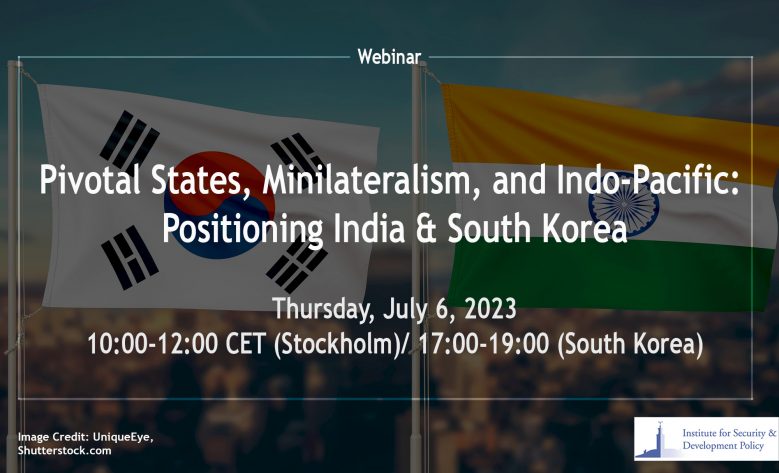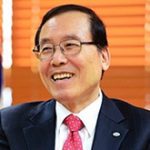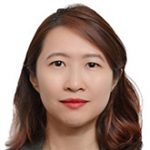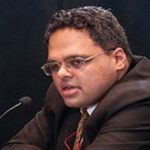Pivotal States, Minilateralism, and Indo-Pacific: Positioning India & South Korea

Did you miss this webinar? The full recording is available on ISDP’s YouTube channel.
Since his election to office, South Korean President Yoon Suk-yeol has pushed to realize his promise of making South Korea a global pivotal state (GPS). Put simply, this implies a transformation in the country’s foreign policy to make it a much more active player, not only in its immediate neighborhood of the Korean Peninsula and Northeast Asia but also in the Indo-Pacific region and beyond. Over the last few months, this new shift has become amply evident in South Korean foreign policy, with its focus on promoting liberal democratic values like freedom, peace, and prosperity. What does South Korea as a GPS mean, and what are its implications for partner states in the region, like India?
In this expanded focus beyond Northeast Asia, and the aim to become a GPS, South Korea is increasingly prioritizing the diversification of its foreign relations with middle powers like India, Japan, ASEAN, the EU, and NATO. In essence, these partnerships can help South Korea strengthen its voice in regional and global affairs, while also helping it better navigate the increasingly complex Sino-American great power competition. Among these partners, India plays a highly vital role; in other words, New Delhi now matters more than ever to South Korean leadership, as a pivotal Indo-Pacific, cyber, science and technology, defense, and economic partner.
India is increasingly critical to regional and global security. Given the importance of the Indo-Pacific for global trade, India’s geographic positioning means it holds a crucial role in the protection of navigation and also in the control of strategic maritime choke points. This makes New Delhi a central player in maritime security in the Indo-Pacific and India has been expanding its dominance over the Indian Ocean to respond to the frequent threats. In effect, greater geopolitical contestation has prompted India to be increasingly active and assume new global responsibilities, particularly in the domain of maritime security. India’s salience is visible in Seoul’s Indo-Pacific strategy, their bilateral defense deals, and their recently held foreign policy and security dialogue. In fact, the ROK’s Indo-Pacific strategy recognizes India as a special strategic partner and aims to accord a lot more significance to their partnership than previously.
As South Korea seeks to move from becoming a mere observer of global politics to an active regional and global player, both South Korea and India can find greater alignment in their shared interests and vision in the Indo-Pacific. For one, both countries stand for a common vision of a free, open, secure, and prosperous Indo-Pacific region, that goes beyond great power politics and competition. As India and South Korea celebrate 50 years of diplomatic ties, they can build on their convergences and enhance cooperation and high-level exchanges to consolidate their Special Strategic Partnership. The ROK’s pivotal state identity is strikingly similar (though not identical) to India’s own multi-aligned (if not pointed-aligned) foreign policy stance. What is interesting is how New Delhi aims to advance the ‘Global South’ proposition in its multi-aligned foreign policy that does not confront South Korea’s pivotal states proposition.
This webinar (supported by the Korea Foundation) aims to position India and South Korea through the debate of the pivotal state. In particular, it aims to address the following:
- How critical are the pivotal states for the security of the Indo-Pacific?
- How do pivotal states perceive a mini-lateral mode of cooperation in the Indo-Pacific? Do they perceive mini-lateral cooperation ahead of multilateral cooperation, or vice-versa?
- What do the pivotal states mean in South Korean and Indian foreign policy approaches? Do they (South Korea & India) qualify to be called pivotal states?
- How could South Korea and India strengthen their existing strategic partnership within the ambit of Global Pivotal States (GPS) and the Global South proposition?
Keynote speaker:
 Dr. Choong Yong Ahn is currently a Distinguished Professor at the Graduate School of International Studies, Chung-Ang University Seoul. He was a Co-Chair of the Korea-India Strategic Dialogue organized by the Seoul International Forum. Previously, he was Chairman, Korea Commission for Corporate Partnership (KCCP: 2014-2018) to induce voluntary collaborations between Korea’s big businesses and SMEs, and also Chairman of the Board, Korea Electric Power Corporation. Before taking the KCCP post, he served as presidentially appointed Foreign Investment Ombudsman (2006-2014) for foreign direct investors in Korea. He is also the former Chairman of the Presidential Regulatory Reform Committee (2010-2012). While on sabbatical from Chung-Ang University, he also served in several posts such as the President of the Korea Institute for International Economic Policy (2002-2005); Chair of the APEC Economic Committee (2002-2005); Chair of the Board, Choheung Bank; consultant to the World Bank; UNIDO Chief Technical Advisor to the Economic Planning Unit of Malaysia to design Malaysia’s industrial master plan; and served as President of several academic societies in Korea including the Korea International Economics Association, Korean Association of Trade and Industry Studies, and the Korea Econometric Society. He is the author of the forthcoming book South Korea and Foreign Direct Investment: Policy Dynamics and the Aftercare Ombudsman (Routledge, 2023). Dr. Ahn is the co-investigator of the Korea Foundation funded ISDP project “Framing an India-South Korea Connect in Indo-Pacific: Minilateralism to Multilateralism”.
Dr. Choong Yong Ahn is currently a Distinguished Professor at the Graduate School of International Studies, Chung-Ang University Seoul. He was a Co-Chair of the Korea-India Strategic Dialogue organized by the Seoul International Forum. Previously, he was Chairman, Korea Commission for Corporate Partnership (KCCP: 2014-2018) to induce voluntary collaborations between Korea’s big businesses and SMEs, and also Chairman of the Board, Korea Electric Power Corporation. Before taking the KCCP post, he served as presidentially appointed Foreign Investment Ombudsman (2006-2014) for foreign direct investors in Korea. He is also the former Chairman of the Presidential Regulatory Reform Committee (2010-2012). While on sabbatical from Chung-Ang University, he also served in several posts such as the President of the Korea Institute for International Economic Policy (2002-2005); Chair of the APEC Economic Committee (2002-2005); Chair of the Board, Choheung Bank; consultant to the World Bank; UNIDO Chief Technical Advisor to the Economic Planning Unit of Malaysia to design Malaysia’s industrial master plan; and served as President of several academic societies in Korea including the Korea International Economics Association, Korean Association of Trade and Industry Studies, and the Korea Econometric Society. He is the author of the forthcoming book South Korea and Foreign Direct Investment: Policy Dynamics and the Aftercare Ombudsman (Routledge, 2023). Dr. Ahn is the co-investigator of the Korea Foundation funded ISDP project “Framing an India-South Korea Connect in Indo-Pacific: Minilateralism to Multilateralism”.
Speakers:
 Jeffrey Robertson is an Associate Professor of Diplomatic Studies at Yonsei University. Before academia, he worked for the Australian Government in the field of diplomacy, foreign policy, and North Asia. His research interests include the diplomatic practice and foreign policy of middle powers with a focus on North Asia and the Korean Peninsula. He’s currently completing The North Korea Watchers, an academic monograph using ethnographic fiction to reconstitute the diverse stories of the North Korea watcher community into a cohesive and engaging study of espionage, foreign policy and folly. He writes and updates research at https://junotane.substack.com and on Twitter @junotane.
Jeffrey Robertson is an Associate Professor of Diplomatic Studies at Yonsei University. Before academia, he worked for the Australian Government in the field of diplomacy, foreign policy, and North Asia. His research interests include the diplomatic practice and foreign policy of middle powers with a focus on North Asia and the Korean Peninsula. He’s currently completing The North Korea Watchers, an academic monograph using ethnographic fiction to reconstitute the diverse stories of the North Korea watcher community into a cohesive and engaging study of espionage, foreign policy and folly. He writes and updates research at https://junotane.substack.com and on Twitter @junotane.
 Dr. Hoo Chiew-Ping is Senior Lecturer in Strategic Studies and International Relations, National University of Malaysia (UKM). She is concurrently Co-Founder and Co-Convenor of East Asian International Relations (EAIR) Caucus, Adjunct Lecturer at the Malaysian Armed Forces Defence College (MAFDC), and Editorial Board Member of the AUP Politics and IR in Asia Series, Amsterdam University Press. Her main research interests include US-ROK alliance strategy towards North Korean provocations, Southeast Asia-North Korea relations, ASEAN-Korea partnership, and nuclear security in Asia-Pacific. From 2021 until early 2023, Dr. Hoo was a member of Asia Pacific Nuclear Advisory Panel (APNAP), established by the British American Security Information Council (BASIC), a think-tank based in London promoting understanding on nuclear risks and nuclear security. Hoo is the editor of The New Southern Policy: Catalyst for Deepening ASEAN-ROK Relations (ISIS Malaysia, 2020), and a forthcoming co-editing book volume (with Shine Choi and Brian Bridges) on Southeast Asia-DPRK relations. She received her PhD in Politics and International Relations from La Trobe University, Australia.
Dr. Hoo Chiew-Ping is Senior Lecturer in Strategic Studies and International Relations, National University of Malaysia (UKM). She is concurrently Co-Founder and Co-Convenor of East Asian International Relations (EAIR) Caucus, Adjunct Lecturer at the Malaysian Armed Forces Defence College (MAFDC), and Editorial Board Member of the AUP Politics and IR in Asia Series, Amsterdam University Press. Her main research interests include US-ROK alliance strategy towards North Korean provocations, Southeast Asia-North Korea relations, ASEAN-Korea partnership, and nuclear security in Asia-Pacific. From 2021 until early 2023, Dr. Hoo was a member of Asia Pacific Nuclear Advisory Panel (APNAP), established by the British American Security Information Council (BASIC), a think-tank based in London promoting understanding on nuclear risks and nuclear security. Hoo is the editor of The New Southern Policy: Catalyst for Deepening ASEAN-ROK Relations (ISIS Malaysia, 2020), and a forthcoming co-editing book volume (with Shine Choi and Brian Bridges) on Southeast Asia-DPRK relations. She received her PhD in Politics and International Relations from La Trobe University, Australia.
 Wooyeal Paik is an associate professor at the Department of Political Science and International Studies; deputy director, at Yonsei Institute of North Korean Studies; and Director, of the Center for International Relations, Aerospace Strategy & Technology Institute at Yonsei University, Seoul. He is also a visiting fellow at Institut de recherche stratégique de l’École militaire (IRSEM), Paris and adjunct professor at Vrije Universiteit Brussel, Brussels. Advising diverse Korean ministries, he was on the advisory committee on Korea’s New Southern Policy.
Wooyeal Paik is an associate professor at the Department of Political Science and International Studies; deputy director, at Yonsei Institute of North Korean Studies; and Director, of the Center for International Relations, Aerospace Strategy & Technology Institute at Yonsei University, Seoul. He is also a visiting fellow at Institut de recherche stratégique de l’École militaire (IRSEM), Paris and adjunct professor at Vrije Universiteit Brussel, Brussels. Advising diverse Korean ministries, he was on the advisory committee on Korea’s New Southern Policy.
 Dattesh D. Parulekar (Ph.D), is an Assistant Professor of International Relations, at the School of International and Area Studies (SIAS), Goa University. Some of his areas of specialization include India’s Foreign Policy, Strategic Maritime Affairs w.r.t. the Indo-Pacific, African Strategic Affairs, Latin American Political Economy, etc. He is a Visiting Faculty at national defence institutions, viz., Naval War College, College of Defence Management, College of Air Warfare, Defence Services Staff College, Army War College and National Defence College. Besides, he is a Visiting Faculty at the Rashtriya Raksha University (Gujarat), as also a Visiting Faculty at the Indian Institute of Technology, Kanpur, and the Indian Institute of Management, Indore, besides being a Fellow at the Middle East Institute (MEI), New Delhi. He is professionally associated with universities and think tanks in China, and across Europe, Latin America, and South Asia.
Dattesh D. Parulekar (Ph.D), is an Assistant Professor of International Relations, at the School of International and Area Studies (SIAS), Goa University. Some of his areas of specialization include India’s Foreign Policy, Strategic Maritime Affairs w.r.t. the Indo-Pacific, African Strategic Affairs, Latin American Political Economy, etc. He is a Visiting Faculty at national defence institutions, viz., Naval War College, College of Defence Management, College of Air Warfare, Defence Services Staff College, Army War College and National Defence College. Besides, he is a Visiting Faculty at the Rashtriya Raksha University (Gujarat), as also a Visiting Faculty at the Indian Institute of Technology, Kanpur, and the Indian Institute of Management, Indore, besides being a Fellow at the Middle East Institute (MEI), New Delhi. He is professionally associated with universities and think tanks in China, and across Europe, Latin America, and South Asia.
Moderator:
 Dr. Jagannath Panda is the Head of the Stockholm Center for South Asian and Indo-Pacific Affairs at the Institute for Security and Development Policy, Sweden. He is also a Senior Fellow at The Hague Center for Strategic Studies, The Netherlands, and an International Research Fellow at the Canon Institute for Global Studies in Japan. Dr. Panda has testified to the US-China Economic and Security Review Commission at the US Congress. He is also the Series Editor for Routledge Studies on Think Asia. As a senior expert on China, East Asia, and the Indo-Pacific affairs, Dr. Panda’s research focuses primarily on India’s relations with Indo-Pacific powers (China, Japan, Korea, USA); China-India Relations, EU-India Relations; and EU’s infrastructure, connectivity and maritime initiatives in Indo-Pacific. Dr. Panda is the principal investigator of the Korea Foundation-funded ISDP project “Framing an India-South Korea Connect in Indo-Pacific: Minilateralism to Multilateralism”.
Dr. Jagannath Panda is the Head of the Stockholm Center for South Asian and Indo-Pacific Affairs at the Institute for Security and Development Policy, Sweden. He is also a Senior Fellow at The Hague Center for Strategic Studies, The Netherlands, and an International Research Fellow at the Canon Institute for Global Studies in Japan. Dr. Panda has testified to the US-China Economic and Security Review Commission at the US Congress. He is also the Series Editor for Routledge Studies on Think Asia. As a senior expert on China, East Asia, and the Indo-Pacific affairs, Dr. Panda’s research focuses primarily on India’s relations with Indo-Pacific powers (China, Japan, Korea, USA); China-India Relations, EU-India Relations; and EU’s infrastructure, connectivity and maritime initiatives in Indo-Pacific. Dr. Panda is the principal investigator of the Korea Foundation-funded ISDP project “Framing an India-South Korea Connect in Indo-Pacific: Minilateralism to Multilateralism”.
This event is supported by the Korea Foundation, South Korea.